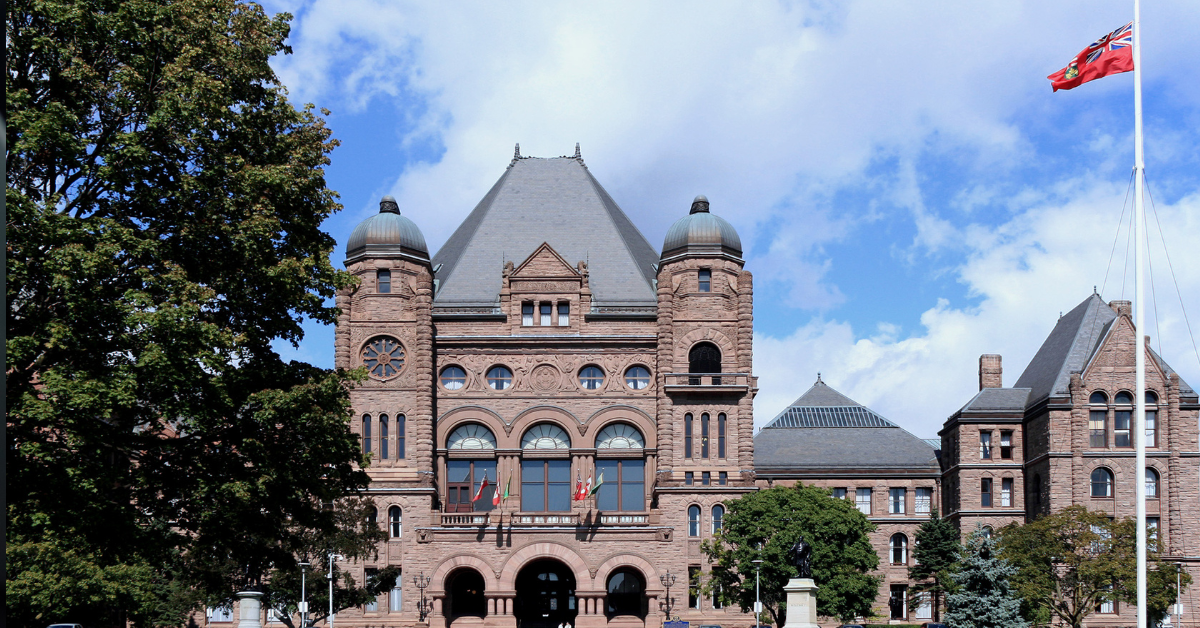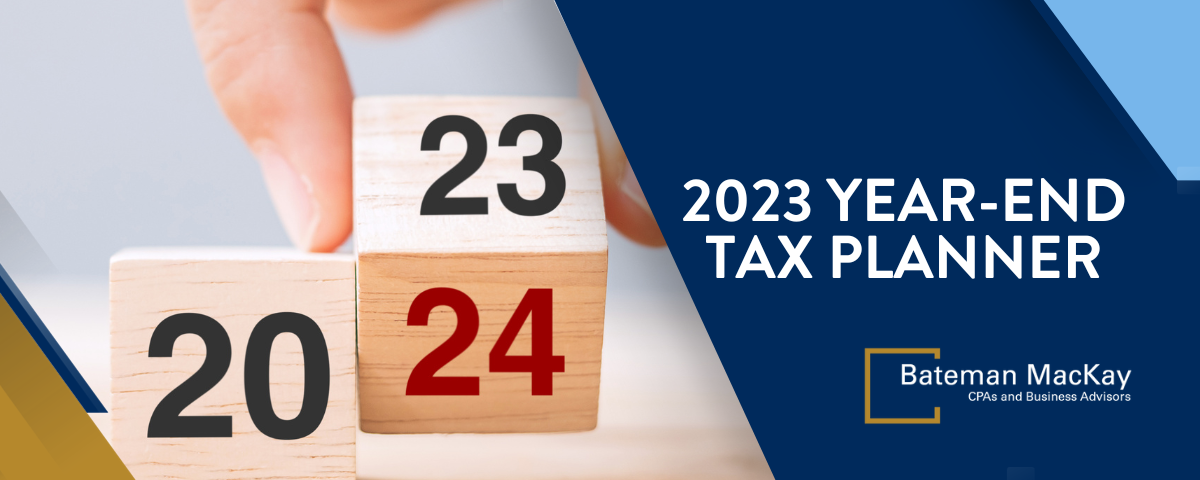Engaging in tax planning with the experts at Bateman MacKay can often be a multi-year process. As the 2023 calendar year comes to a close, it becomes crucial to assess your existing tax strategies for the current and future taxation years which may guide your actions prior to December 31, 2023. This article briefly denotes some 2023 income tax and Canada Revenue Agency (CRA) policy changes in addition to tax planning opportunities. Should you have any inquiries regarding these changes or opportunities, we encourage you to contact your Bateman MacKay Business Advisor for personalized guidance and advice tailored to your specific circumstances.
Corporate and Individual Tax Planning
Immediate Expensing of up to $1.5 Million
Accelerate the purchase of depreciable assets to ensure that they are available for use at the end of the year. Accelerating such investments may entitle your business to be eligible to immediately expense up to $1.5 million per tax year and/or take advantage of the Accelerated Investment Incentive.
COVID Canada Emergency Business Account (CEBA) Repayment
The Government of Canada has extended the CEBA repayment deadline to receive partial loan forgiveness to January 18, 2024, or until March 28, 2024, if the CEBA loan holder has submitted a refinancing application. The return on investment for repaying CEBA in a timely manner is high and you should consider planning your corporate cash flows accordingly.
Salary/Dividend Mix
Determine the most beneficial mix of salary and dividends for you and your family members. Consider all relevant factors including personal tax rates, corporate tax rates, RRSP and CPP contributions, provincial deductions and taxes, and available tax credits. Reasonable salaries can be paid to spouses or children who provide services to the business, which also allows for CPP, RRSP and other deductions. A salary of $171,000 will provide the maximum $30,780 in RRSP room for 2023.
Tax on Split Income (TOSI)
Consider paying dividends to a lower income family member who is a shareholder of the company. However, the TOSI may be applicable which would frustrate such tax planning and the dividend income paid to the lower income shareholder would then be taxed at the highest marginal tax rate. The family member who receives such dividends is often required to be actively engaged in the company to avoid TOSI. Tailored professional tax advice is crucial to navigate the TOSI rules.
Corporate Withdrawals
If corporate withdrawals are required, make sure to consider strategies to reduce the effective tax rate of these withdrawals. Using the company’s capital dividend account, repaying shareholder loans or paying tax-effective dividends are all potential options.
Income Timing
If you expect to be in a lower tax bracket next year and receive a year-end bonus, consider deferring the receipt of your bonus to early 2024. You may also request the bonus, or a portion of the bonus, to be transferred directly into your RRSP to prevent the withholding of taxes provided you have sufficient unused RRSP deduction room in the year of the transfer.
Registered Retirement Savings Plan (RRSP) and Tax-Free Savings Account (TFSA) Max Contributions
You have until February 29, 2024, to contribute to your RRSP or a spousal RRSP to be able to deduct the amount on your 2023 return. If you have contribution room, (18% of earned income up to a maximum of $30,780) contributing before December 31, 2023, helps to maximize the tax-deferred growth in your plan.
Contributions of up to $6,500 for 2023 (an annual increase of $500) and any unused contribution room from 2009-2022 can be made to the TFSA. The TFSA allows for tax-free investment income including interest, dividends and capital gains, which may result in higher growth compared to a regular taxable account. Tax-free withdrawals can be made at any time, but caution that any amount withdrawn is not added back to your contribution room until January 1 of the following year.
Changes to Alternative Minimum Tax (AMT) Effective January 1, 2024
There are numerous changes impacting the calculation of AMT (discussed further below). These changes should be reviewed with a tax professional as they could impact your tax planning as it relates to charitable donation planning, sale of shares (including shares eligible for capital gains exemption), and claiming large deductions amongst other areas. Certain transactions may be more favourable from an AMT perspective to be implemented prior to January 1, 2024, to take advantage of the current AMT regime.
Relevant Tax Changes for Business Owners
Alternative Minimum Tax (AMT)
Key changes were made to the Alternative Minimum Tax (AMT) in 2023, including raising the AMT rate from 15% to 20.5%, and increasing the exemption threshold to $173,000, aligning with the start of the fourth tax bracket for 2024. Additionally, these changes limit tax credits, exemptions and deductions that can be applied to the AMT. However, the existing provision for recovering AMT over the next seven years remains unchanged. These changes are slated to be effective for the 2024 personal tax year.
Mandatory Disclosure Rules (MDR)
The MDR apply to avoidance transactions occurring after June 21, 2023, and for taxation years ending after 2022. An “avoidance transaction”, where a transaction exists primarily for the purposes of tax benefits, must be reported to the Canada Revenue Agency (CRA) if it falls into one of three categories: reportable transactions, notifiable transactions, or uncertain tax treatments. Your tax expert should notify you if a planned tax transaction requires a mandatory disclosure.
Intergenerational Business Transfer (IBT) and Employee Ownership Trusts (EOT)
Legislation introduced in 2021 was designed to facilitate the transfer of family businesses to the next generation. This legislation allowed for parents to utilize the lifetime capital gains exemption or simply receive capital gain treatment on the disposition of their shares in a Canadian Controlled Private Corporation (CCPC), and enjoy the same tax benefits available on a sale to unrelated third parties. However, CRA concerns arose for inappropriate tax advantage where there was no factual transfer of a business to the next generation. For share sales occurring on or after January 1, 2024, amendments to these rules were proposed to ensure that they apply only where a genuine Intergenerational Business Transfer (IBT) takes place.
Employee Ownership Trusts (EOTs) are a Canadian-resident trust that holds shares of qualifying businesses for the benefit of employees to facilitate and promote employee ownership of small and medium-sized businesses. EOT legislation is scheduled to come into effect on January 1, 2024.
Both the IBT and EOT should be reviewed with your Bateman MacKay tax advisor as possible key tools for the implementation of a tax-effective succession plan.
Excessive Interest and Financing Expenses Limitation (EIFEL)
For tax years beginning on or after October 1, 2023, the Excessive Interest and Financing Expenses Limitation (EIFEL) regime, is designed to limit the amount of net interest and financing expenses that certain corporations and trusts may deduct, to 30% of adjusted taxable income.
General Anti Avoidance Rules (GAAR)
The Canadian Income Tax Act’s General Anti-Avoidance Rule (GAAR) aims to curb abusive tax avoidance without hindering legitimate transactions. Recent changes to the GAAR aim to maintain the focus on the legal form of transactions rather than their economic substance, and introduce a 25% penalty on the tax benefit from transactions deemed abusive under GAAR. However, this penalty can be waived if the transaction is disclosed to the Canada Revenue Agency (CRA), either through mandatory disclosure rules or voluntarily. The GAAR penalties are especially relevant with respect to corporate reorganizations and other tax motivated planning. Additionally, a three-year extension for GAAR reassessments is proposed, except in cases where the transaction has already been disclosed to the CRA.
Beneficial Ownership Registries
As of January 1, 2023, federally incorporated businesses and businesses incorporated inside of Ontario, B.C., Manitoba, New Brunswick, Newfoundland and Labrador and P.E.I. must maintain a registry of all individuals with significant control over the company.
Relevant Tax Changes for Individuals
First Home Savings Account (FHSA)
This account, which became available on April 1, 2023, is designed to help first-time home buyers save up to $40,000 for their first home. Contributions to a First Home Savings Account (FHSA) would be deductible (like an RRSP), and income earned in an FHSA as well as qualifying withdrawals from an FHSA made to purchase a first home would be non-taxable (like a TFSA). The lifetime limit on FHSA contributions would be $40,000, subject to an annual contribution limit of $8,000.
Trust Reporting
Originally announced in 2018 and delayed several times, updates to trust reporting intend to apply for 2023 T3 trust returns (due in 2024). These updates mandate trusts to file returns even in non-income-earning years and require detailed disclosure of all trustees, beneficiaries, and settlors, as well as anyone who can influence trustee decisions regarding income or capital appointments. Additionally, a significant penalty for non-compliance, involving 5% of the trust’s maximum fair market value of property in the year (with a minimum of $2,500), will be imposed for failures to file either knowingly or due to gross negligence.
Residential Property Flipping
For 2023 and subsequent taxation years, profits from the sale of residential properties (including rental properties) that were owned for a period of fewer than 12 months are now deemed to be business income. The profit is therefore fully taxable as business income (100% taxed), and not a capital gain (50% taxed, and potentially eligible for the principal residence exemption).
2024 Canada Pension Plan (CPP) Changes
The second phase of the Canada Pension Plan (CPP) enhancement begins in 2024. The first phase gradually increased the contribution rate over 2019 to 2023. The second phase introduces a second, higher earnings limit. For 2024, when a taxpayer surpasses the maximum annual pensionable earnings of $68,500 (including the basic exemption amount of $3,500), they will pay 4% CPP on earnings between $68,500 and $73,200 (the additional maximum annual pensionable earnings) for a maximum additional contribution of $188 for employees.
Underused Housing Tax
The Federal Underused Housing Tax of 1% of the value of the home, which may apply to vacant or underused residential property, must be paid and filed for the first time in 2024 for the 2022 and 2023 tax years. In general, residential properties that are vacant for more than half of the year must pay this new tax. Additionally, residential properties owned by trusts or private corporations must file this return regardless of any tax owed.
Vacancy Tax
Several Canadian municipalities are implementing or considering a vacant residential property tax, in addition to the Federal Underused Housing Tax (UHT). In cities like Toronto, Ottawa, and Vancouver, all residential homeowners must file an annual return, which may result in a tax if the property is not their primary residence. In 2023, Vancouver’s vacancy tax rate increased to 5%. Toronto’s 2023 Vacancy Tax rate increased to 3% and Ottawa remains at 1% of the property’s value, with varying deadlines for filing and payment. Hamilton has approved a Vacant Home Tax starting in 2024, while Peel Region has delayed its vacancy tax due to the forthcoming dissolution of the region.
Home Office Deductions
The Canada Revenue Agency (CRA) has ended the use of the simplified method to claim an income tax deduction for home office expenses (i.e. deducting a flat rate of $2 per day worked at home due to the COVID-19 pandemic) for the 2023 taxation year. Employees looking to claim home office expenses must be required to work from home by their employer for more than 50% of the time. Employees must also only use the workspace to earn employment income and on a regular and continuous basis for meeting clients, customers or other people in the course of their employment duties.




